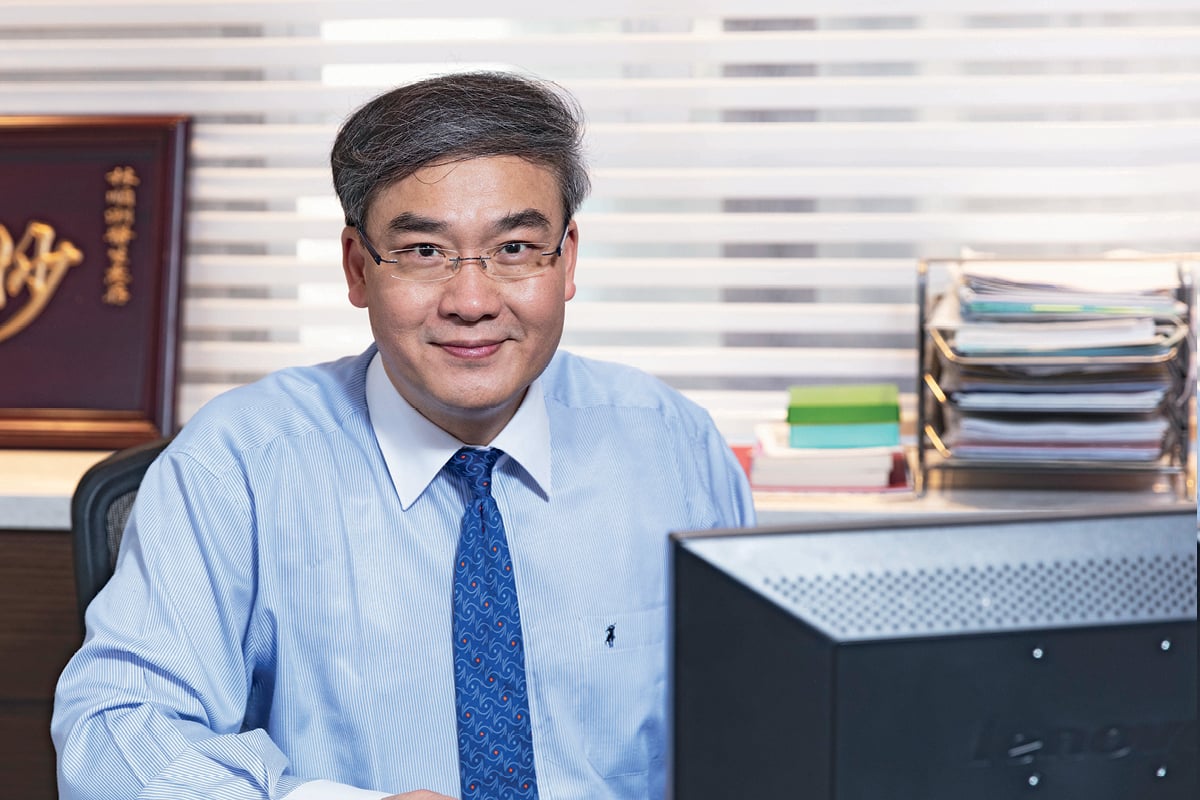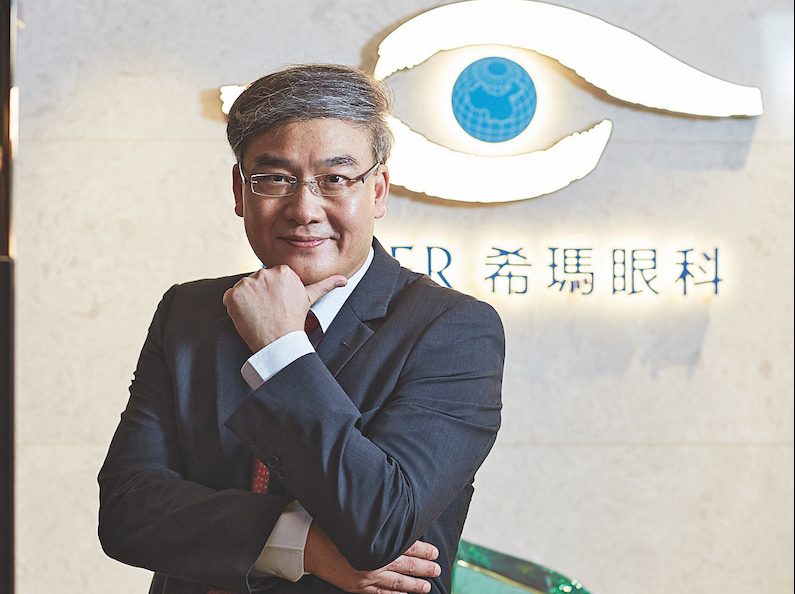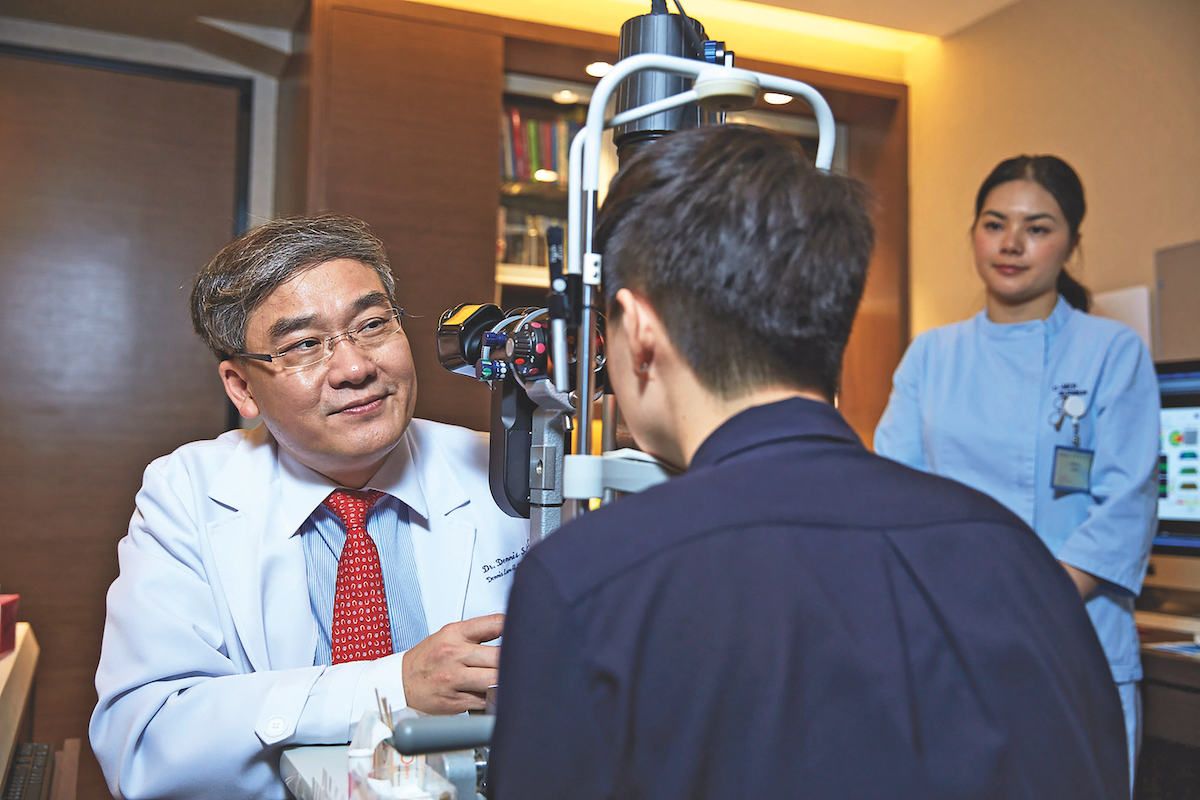When ophthalmology practice C-MER Eye Care was listed on the Hong Kong Stock Exchange in January 2018, it thrust its founder Dr Dennis Lam into the billionaire’s club. But even without the new title, Dennis’ contributions to ophthalmology have brought him high acclaim throughout his 30-year career.
Dennis has been Chairman of the Department of Ophthalmology and Visual Sciences (DOVS) at the Chinese University of Hong Kong, President and organising committee chair of the 2008 World Ophthalmology Congress, and Council member of the International Council of Ophthalmology, to name a few. He has contributed more than 800 articles to academic journals, has been an editor for several books on ophthalmology, and owns a patent for a potential new glaucoma drug. He is also committed to helping eliminate cataract blindness in Hong Kong and China.

When asked if there was anything he would have done differently, Dennis laughs and says, “There are many things I could have done differently.” But adds, “Every day is a miracle. And it has been amazing to be involved in so many things.”
After stepping down as chairman of DOVS in 2011, Dennis established C-MER (pronounced see-mer) in 2012. The company provides ophthalmic services to treat common as well as more complex eye conditions. One of its primary objectives was to address the growing myopia (short-sightedness) trend in China. “There are an estimated 600 million people in China alone who have myopia,” Dennis notes. “Those with a higher degree of myopia may develop ocular complications such as cataracts, glaucoma, retinal detachment or macular problems.”
“There are an estimated 600 million people in China alone who have myopia.”
Dennis highlights that people 49 years and older are more likely to develop myopia complications, and it is these complications that have become the leading cause of blindness in the country. “But there are a lot of things we can do such as injecting special medicine to take care of macular haemorrhage (bleeding) caused by a high degree of myopia, or surgery.”
However, C-MER wants to prevent the progression of myopia by first addressing patients when they are young. “We have special eye drops and lenses – all of which are important services we can provide to the young ones,” Dennis explains. “And when they are over 18, and their myopic level is stable, we can provide laser eye surgery. Nowadays, the surgery is becoming much safer and the wounds much smaller.” Dennis adds, “In China, we are moving towards an ageing population, so the demand for eye care is also becoming larger.”
In ophthalmology, Dennis says, innovation, technology and precision medicine have become more commonplace. “We have been having rapid development in terms of minimally invasive surgeries,” he notes. “Many surgeries nowadays are suture-less. For example, cataract surgery is done without a single stitch; refractive surgery for myopia, again, uses laser; and even major surgeries for retinal detachment and macular surgery – vitrectomies – do not require them.” And when it comes to cataract surgery, Dennis says it is not just about removing the cloudy lens.
“We also take care of the astigmatism and the original refractive stages such as short-sightedness or long-sightedness. When we remove the cloudy lens, we insert an artificial intraocular lens (IOL). We are then able to incorporate this lens to neutralise the original refractive errors if they choose a multifocal IOL. And after the surgery, people can do without reading glasses and have no more astigmatism.”
The vision for C-MER
C-MER is an acronym for clinical service, management, education and research. Following its initial clinic, the Central Eye Centre, C-MER opened five others in Yuen Long, Mong Kok, Shatin, Causeway Bay and Kwun Tong.
“We are providing patient-centric, holistic care,” Dennis says. “Safety and quality are the bottom line. We believe each patient is an individual, and because of this, we say we are not treating the eye problem of a patient, we are treating a patient with an eye problem. We have to take care of not just the eye, but the whole person.”
“We are not treating the eye problem of a patient, we are treating a patient with an eye problem.”
And Dennis sees the benefits of not keeping the business solely in the main city areas of Hong Kong. “Instead of having a major centre in the hospital, we do the opposite,” he says. “We go out to the different districts of Hong Kong, which is a lot more convenient for the patients. We are also expanding the company in such a way that it is a win–win. If you’re just sitting in the prime areas of the CBD in Hong Kong, then there are a lot of people who will not be able to come in for treatment.”

The company has since expanded its reach to China, establishing the Shenzhen C-MER Dennis Lam Eye Hospital. This was a major achievement as it was the first privately owned Hong Kong hospital to be built in China under the Closer Social Economic Partnership Agreement (CEPA). CEPA is the first-ever free trade agreement between mainland China and Hong Kong and is designed to further enhance economic cooperation and business opportunities between them.
“Under this scheme, Hong Kong doctors can do surgeries for patients in China or practise in China, without having to take another examination,” Dennis says. “And we are able to own 100 per cent of our hospitals in China. We are the first in Hong Kong to achieve this with our Shenzhen hospital, which we opened in 2013.
“In the past, medical service in China was mainly produced by the public service. However, the Chinese government now wants to have both private and public sectors involved so that they can provide complementary services. I think this a win–win–win situation: a win for patients; a win for the medical field in Hong Kong; and a win for medical reform in China. The project focused on eye services has been very successful and we are rapidly expanding.”
Dennis further describes the benefits of opening a practice in China. “Being a doctor, the most important task is to take care of patients,” he says. “We should be going to places where there are patients. A big part of our operations is in China because there are a lot of patients there. China is developing rapidly in a lot of areas but there is still a gap between China and other developed countries in medical practice.
C-MER is hoping to provide care that is up to international standards for patients. If we were to just focus on serving Hong Kong citizens, that is only a population of about seven million. But if we can cross the border, it means millions more patients. So the opportunities for Hong Kong medical practitioners will be much better.”
The C-MER hospital in Shenzhen quickly launched to fame in 2013 after Dennis performed eye surgery on a six-year-old Chinese boy, whose eyes had been gouged out in a horrific incident. In the surgery, which was done free of charge, the boy received artificial eyeballs that were attached to the eye tissue and muscle, which allowed movement. Although the boy is not able to see with the implants, it is hoped that in the future he may be able to sense motion and shapes through sensors on his tongue or forehead. The medical team is waiting on technology that may help him see again in the future.
Reaching milestones
One of the company’s greatest achievements was getting listed. Its cornerstone investors include business magnates such as Tencent founder and chairman, Pony Ma, and chairman of property development firm Lan Kwai Fong, Allan Zeman.
“We knew that if we did not have IPO status, it would be difficult to evaluate our worth,” Dennis says. “But if we have this IPO platform, it means we have reached a benchmark, and we are accredited by the financial markets. So with this IPO status, we will have the financial means to go ahead with our expansion, and possible mergers and acquisitions, and also recruit top talent so that we are in a better position.” Shortly after listing, C-MER opened its newest eye hospital in Beijing.
“Beijing is very important because this is the most important medical referral city of the whole country,” Dennis says. “From the patient’s point of view, if you have a serious medical condition that cannot be taken care of by local doctors or hospitals, you go to Beijing. It is the last hope for many patients. Beijing is also the political centre of China. So, if you can get a foothold there, it will facilitate your future growth in the rest of China.”

The company has more than 50 full-time doctors, including both national and international professionals. The inclusion of international staff is an advantage, Dennis says, as it creates a bigger talent pool with high levels of expertise. “If we did not have such international participation, our choices would be limited. There are a lot of things you can learn from interacting with people from different countries. It makes life more interesting and makes our network much bigger because if we have a person coming from the UK or India, we get the benefit of their networks.” But, Dennis warns, language can be a double-edged sword. “Foreigners will need translators in China or will need to learn the local language, which takes a long time. However, we also have English-speaking patients, especially in Beijing, Guangzhou and Shanghai – all major cities in China.”
Leadership style
Dennis says he uses both transactional and transformational leadership styles. “The first is
so that when something has been decided, you can get it done. The other is so that we can move from one level to the next. As a leader, you have to be good at both styles, but many
of the transactional things could be delegated. However, for the transformation stuff, the leader will have to shoulder most of the responsibility.”
Dennis further details what he prioritises in leadership, using the acronym VIPS. Each letter in VIPS, however, corresponds to two ideas. “With a potential new project or employee, I consider whether they would fit our overall development.
“So the number one criterion is ‘V’ for vision. Everything has to fit our vision, which also has to be crystal clear. The other ‘V’ is for value; we have to have integrity and our bottom line values so that we don’t deviate from the right direction,” he explains.
“The letter ‘I’ relates to innovation and insight. Nowadays, you cannot survive just by working hard. You have to work smart as well, with a lot of innovation. And you gain insight from the things that happen around you. ‘P’ is for partnership; you cannot do things on your own. You can only achieve a lot by having good partnerships. The other ‘P’ is for priority; you can never achieve all that you want to do, however, you can prioritise to focus on your most important goals. And by doing these well, you can make an impact,” he continues.
For ‘S’, Dennis goes back to basics and relates it to the SWOT (strengths, weaknesses, opportunities and threats) analysis. “I ask my staff to do a SWOT analysis for career development, looking at their internal strengths and weaknesses and what opportunities and threats are around. This is applicable to individuals as well as to projects,” he explains. “For example, when you want to expand to a particular city, you need to make a critical analysis. Through this, you get to see whether you are strong enough, whether the opportunity is there, or whether you should not be going there. Doing a SWOT analysis is my basic routine.” The other meaning for ‘S’ is the prevention and management of stress.
Riding the bandwagon
Having founded his own practice, which has seen rapid success in just a few years, Dennis shares this advice with aspiring business owners: “You have to look into the future to ride the bandwagon. If you are doing something that has not been given the right environment, then you won’t be successful,” he says. “For instance, we know there are a lot of patients in China and there is a lot we can do for them. But, if there is no medical policy to support these components of health care, then we won’t be able to do those things.”
Speaking of opportunities, Dennis encourages budding business owners to seek them out, especially those happening in and around Hong Kong. “In China, in particular, we are talking about the Big Bay area development, covering 11 cities including Hong Kong, Shenzhen, Guangzhou and Macau. The GDP in these areas could become one of the biggest in the world,” he muses. “The population is over 70 million and there is a high-speed train by which you can travel to each of these cities within an hour. This is a major opportunity for people in Hong Kong.”

Dennis also mentions taking everything back to basics with the analysis of the current environment your new business is heading into. “You have to be down-to-earth. So, do a good SWOT analysis of your business and be very critical in seeing what it can and cannot do,” he suggests. “And then you need to have good partnerships. If you try to do it all on your own it will be quite difficult – the challenges may be too big. And finally, you can accept failure after trying it out, but you cannot accept failure without trying.
“You cannot just look at your drawing board. At some point, you have to make your first strike.”


